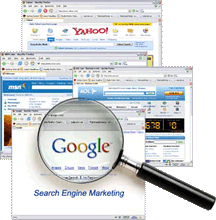
There are so many different things people are saying you should do in order to increase search engine optimization. Unfortunately, search engine algorithms are continually changing, so some of these things are not truly effective and other are no longer as effective as they once were.
Below is a summary of “myths” often said to increase your results and some additional comments from TBH Creative.
1) Use a Keyword Rich Domain Name: It is widely believed that if you include your keywords in your domain name like www.professional-website-design-in-nj.com it will greatly improve your rankings. This is not true. It is best to choose a domain name that is short, easy to remember and if possible includes your company name.
2) Google Partnership: If you are ever approached by a company claiming to have a partnership with Google, run in the opposite direction. There is no such thing as a “preferred” relationship with Google and in fact on Google’s website it even states: Beware of SEOs that claim to guarantee rankings, allege a “special relationship” with Google, or advertise a “priority submit” to Google.
3) Meta Keyword Tag: It used to be that the Meta Keyword Tag was given a lot of weight in the early days of Search Engine Optimization, but people abused it and now it does very little. You may still want to include your keywords here, but know that it will not do much and in fact most search engines won’t even check it.
Although “keywords” are used only very little in your ranking, TBH Creative recommends that you include them anyway. We also encourages the inclusion of the meta tag “description” tag that will appear as the text in the results of search engine searches. Above the meta tags, each page should include a proper “title” tag that includes your targeted keywords.
4) Bold or Italicized Text: Adding emphasis to certain keywords like using bold or italics can make your text easier to scan for the reader if done properly, but has little to no effect on your search engine ranking.
5) Content Length: There is no search engine rule stating that your content needs to be a specific number of words in order to get indexed. Any recommended length is more to assist the reader in understanding what you do than to aid the search engines.
We recommend that you pay attention to the density of your keywords on any given page. For example, a ten paragraph page with two keywords is less effective than a two paragraph page with two keywords.
6) Duplicate Content: Posting specific content like an article or blog entry on your site and then on another site will not get you penalized. In the search results, Google will recognize that the content is the same and only choose one of the pages to display, but it will not hurt your overall search engine ranking.
7) Avoid Flash: Any text that you place in Flash will not be readable by a search engine, but this doesn’t mean you have to avoid flash altogether. You can still very successfully incorporate Flash into your site through rotating pictures or a header on the page. Just don’t have an all Flash site or use a Flash intro if you are interested in increasing your search engine rankings.
Perfect answer! Listen to the professional you have hired about this and choose effective pages over “coolness”… unless you don’t care about ranking at all.
8) Pay-Per-Click: Some say that using Pay-Per-Click will help your organic listing while others say it will hurt. Both are false. The fact is that Google has gone to great lengths to separate the two departments of organic and paid listings to a point where the two departments don’t communicate or even sit at the same table for lunch.
It is a good idea to use search engine marketing (such as pay-per-click) to compliment what you are doing for organic search results. Once your organic search results increase, you can decrease your pay-per-click campaigns.
TBH recommends that you monitor and adjust campaigns regularly to make sure they have a proper return on investment. Hiring a professional company for this service is never a bad idea – just ask for references.
9) Update the Site Frequently: Updating your site often is a good idea if you have something new to say. Just don’t change around a few words to accommodate the search engines as that won’t help your listing at all. Regularly adding legitimate content like articles, press releases and blog entries will help though.
As you add relevant content, remember to keep old pages and content also. Google likely has indexed these pages and making them disappear is counter-productive.
10) Doorway Pages: Many companies will sell this idea of increasing your ranking by creating hundreds of one page sites loaded with keywords that link to you from various domains. This is considered spamming the search engine and is not recommended. If you properly optimize your site and focus on the correct way to get listed, you will improve your ranking much quicker than these doorway pages ever could.
These pages are also referred to as “gateway” or “landing” pages. The author of these valuable search ranking myths is Marc D. Ensign from Sign-N-Vision.
